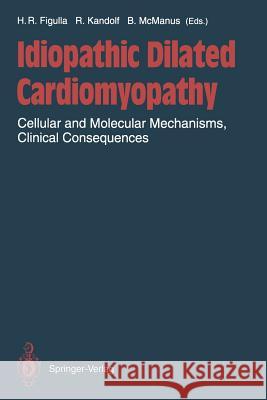Idiopathic Dilated Cardiomyopathy: Cellular and Molecular Mechanisms, Clinical Consequences » książka
Idiopathic Dilated Cardiomyopathy: Cellular and Molecular Mechanisms, Clinical Consequences
ISBN-13: 9783642778933 / Angielski / Miękka / 2011 / 405 str.
Idiopathic cardiomyopathy has been categorized for over 10 years by the World Health Organization as dilated, hypertrophic, or restrictive. These categories have somewhat vague boundaries; however, idiopathic dilated cardiomyopathy (IDC) finds its general definition from unexplained four-chamber dilatation, prominent systolic dysfunction with depressed ejection fraction, a marked increase in total myocardial mass without wall thickening, myocyte hypertrophy and nuclear polyploidy, rarity of frank myocardial scars, but increased interstitial connective tissue and myocyte atrophy, all in the setting of anatomically normal heart valves and coronary arteries. Mural thrombi within cardiac chambers and atrioventricular valve regurgitation are common secondary con comitants. Myocardial inflammation is rare, but immunological abnormalities have been suggested. Ultrastructural features in clude increased mitochondrial numbers, lipid deposits, and myo fibrillar loss. Progressive pump failure with or without rhythm disturbances typically leads to ever-intensified medical therapies, and ultimately to transplantation or early death. The need for better understanding of IDC is represented by incidence rates varying from 5 to 8/100000 population across several populations, 10 000-20000 IDC deaths annually in the United States, and the generally increasing prevalence of the disease. More than 50% of heart transplant recipients have IDC as their primary myocardial disease. The half-life of patient sur vival without transplantation is generally less than 5 years. Treat ment with antiarrhythmics, calcium channel blockers, -adrenergic blockers, and angiotensin-converting enzyme inhibitors is being evaluated in clinical trials, but the role of such treatments in the pathobiology of progressive disease is unclear."











